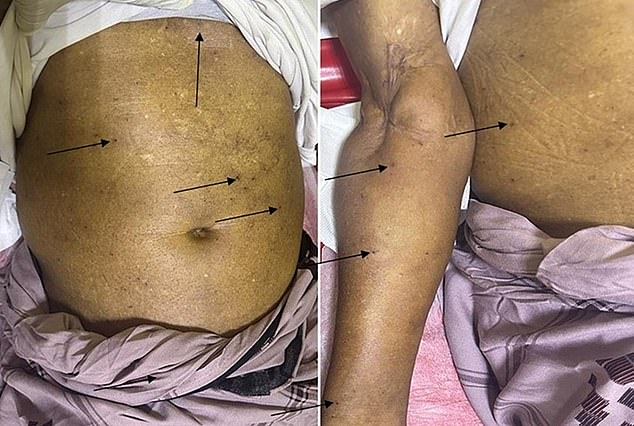It’s a warning all bee-fearers will dread — being stung really could kill you.
A 50-year-old man in Somalia narrowly escaped death after being stung, doctors have revealed.
He suffered multi-organ failure almost a week after the sting by a giant honey bee.
Sharing his case in an academic journal as a warning, medics said such incidents can also trigger strokes or even heart attacks.
Wasp or bee stings kill up to 10 Brits and 60 Americans every year but the risks are little-known.
A 50-year-old man in Somalia narrowly escaped death after being stung, doctors have revealed. He suffered multi-organ failure almost a week after the sting by a giant honey bee. Sharing his case in an academic journal as a warning, medics said such stings can also trigger strokes or even heart attacks
Deaths usually occur as a result of an allergic reaction to the venom, resulting in anaphylaxis — a complication that can kill in minutes.
The estimated lethal dose for humans in stings alone is around 500 to 1,500 stings. But anaphylactic reactions are not dose-dependent.
‘Venom released by bee stings can range from 50 to 140µg each sting, which is a significant enough dosage to cause systemic damage,’ the team from Mogadishu Somali Turkey Training and Research Hospital, said.
The unidentified man, from a rural area, waited six days before attending hospital, complaining of breathing difficulties and not being able to urinate properly.
Medics noted he had ‘multiple’ red marks across his body.
Doctors also found his pulse rate, blood pressure and blood sugar levels were higher than normal and his body temperature slightly below average.
Wasp or bee stings kill up to 10 Brits and 60 Americans every year but the risks are little-known. Deaths usually occur as a result of an allergic reaction to the venom, resulting in anaphylaxis — a complication that can kill in minutes
Blood tests pointed to kidney and liver injury as well as pancreatitis.
An ECG, a test recording the electrical activity of the heart, also found he was suffering a faster-than-usual heart rhythm.
Medics believed he had suffered an allergic reaction and started him on a ‘comprehensive’ regime of steroids, antihistamines and intravenous fluids for hydration.
He also undertook five rounds of hemodialysis, a machine that filters wastes, salts and fluid from the blood.
The patient was discharged after seven days. Follow-up appointments showed he ‘continued to do well’.
Writing in the International Medical Case Reports Journal, doctors said: ‘Bee stings are frequently experienced in Africa, yet there is a scarcity of medical literature specifically focusing on bee stings and their association with multi-organ failure.’
Source: Mail Online
